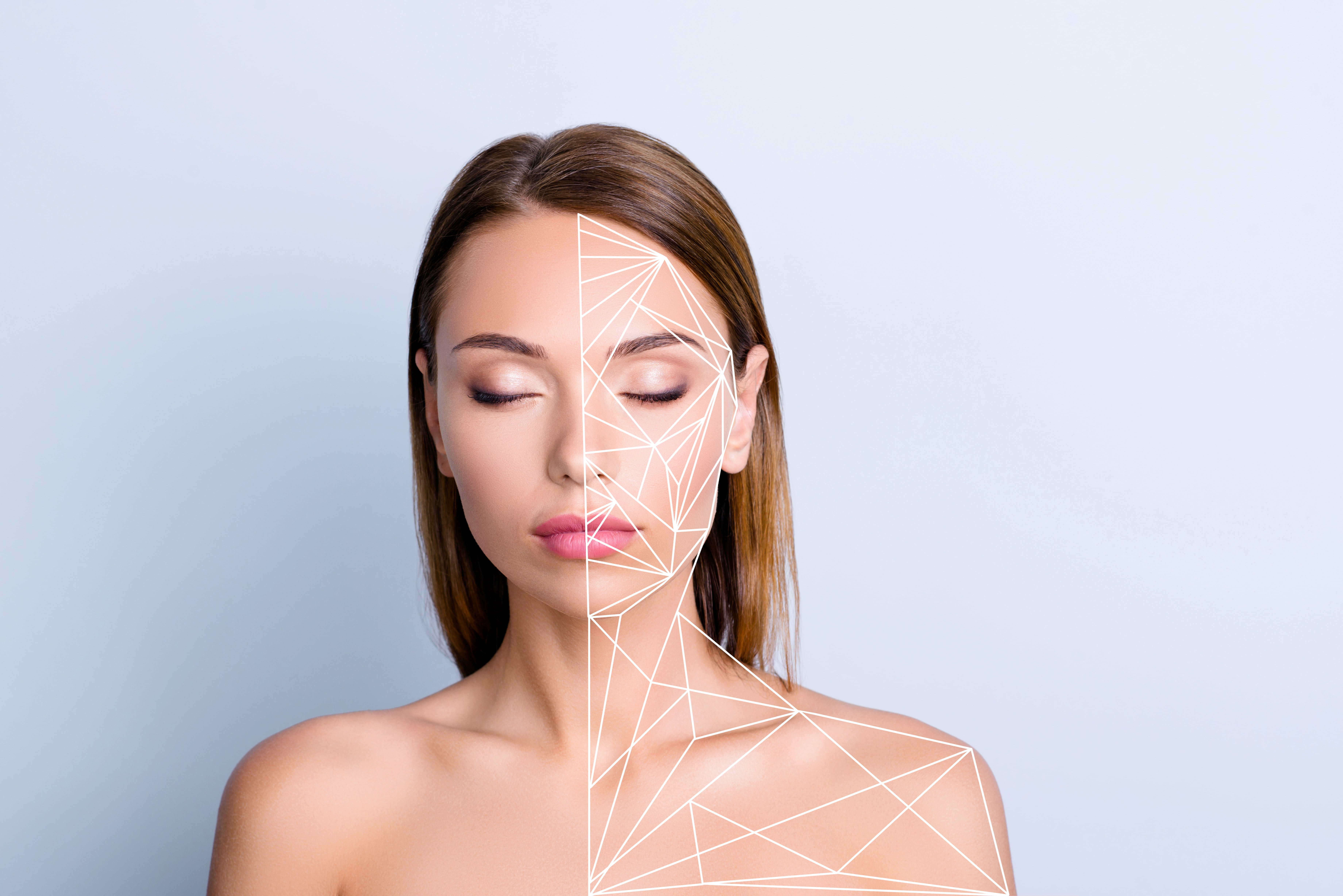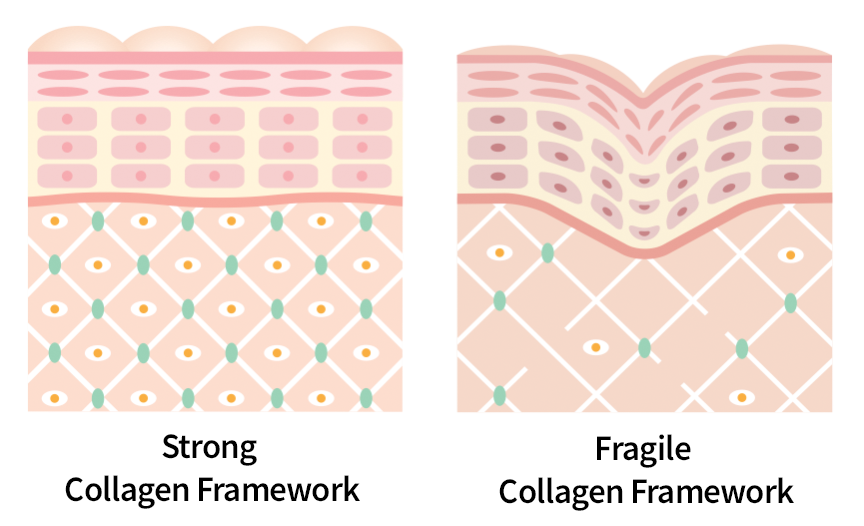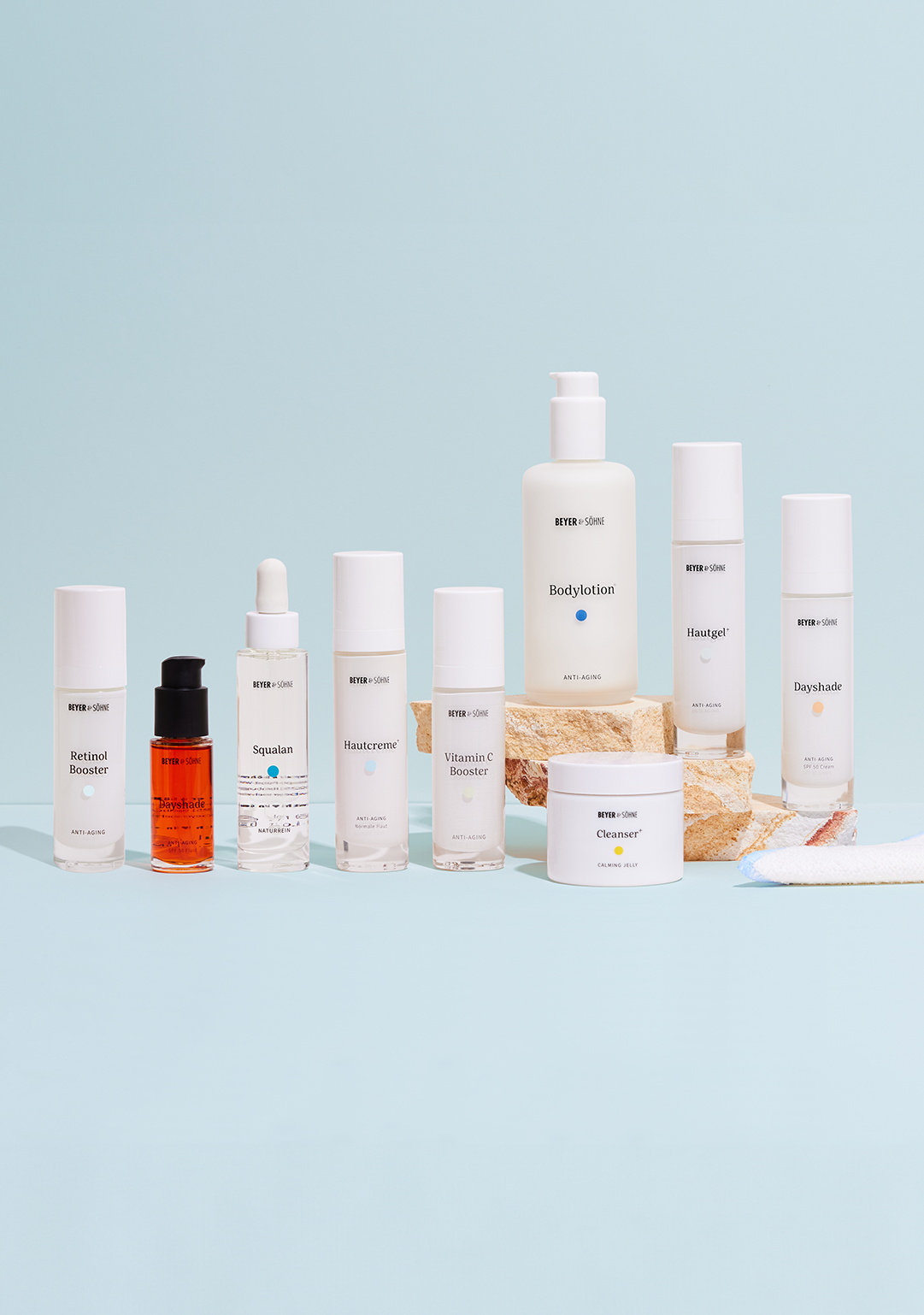More Than Just a Beauty Booster
Collagen – A Foundation for Wrinkle-Free Skin
A resilient collagen framework is the key to keeping our skin free from wrinkles for an extended period. Hence, this protein is pivotal for maintaining our youthful appearance. Unfortunately, merely applying collagen to the skin doesn't yield the desired results. To achieve a lasting effect, it's essential to stimulate the body's natural collagen production. In this article, we'll explore the cosmetic solutions that can assist in this process and why supplements are not a substitute for proper skincare.

Robby Beyer
October 2024

Table of Contents
What is Collagen?
Which skincare products can build collagen?
Protect Your Collagen
Healthy Collagen: Moisturizers Are Important Too
Collagens and UV Radiation
How does UV radiation specifically harm our collagens?
Protecting Collagens from UV Radiation
Pure Collagen in Creams: Does it Work Against Wrinkles?
Collagen as a Dietary Supplement
Do Collagen Capsules or Drinkable Ampoules Help?
Conclusion
Sources
What is Collagen?
Collagen stands out as the most prevalent protein in the human body, constituting 30% of our total proteins. Functioning as a structural protein, it imparts strength to various body parts. Beyond the skin, collagen is also found in bones, cartilage, and teeth. Moreover, collagen plays a vital role in ensuring the tensile strength of our connective tissues.
In the skin's structure, collagen is a fundamental component. Alongside ceramides (responsible for forming the skin barrier), the Natural Moisturizing Factor (which regulates natural moisture content), and hyaluronic acid (a natural moisturizer), collagen serves as the
"foundation" of the skin
.
Collagen creates a scaffold-like structure, providing the framework for the skin to stretch over. As we age, this scaffold becomes increasingly unstable, resulting in looser connective tissue and the formation of wrinkles. Therefore, reinforcing our collagen framework is crucial for minimizing wrinkles. What steps can be taken to strengthen this foundation?
Fibroblasts, skin cells responsible for elasticity and skin density, play a crucial role in producing collagen in our skin. They are indispensable for providing structure to the skin.

A robust collagen framework supports the skin and prevents the formation of wrinkles. Wrinkles arise when the collagen framework is weak.
Which skincare products can build collagen?
How can you stimulate collagen synthesis
and stay wrinkle-free for longer? The most effective approach is through skincare that provides valuable antioxidants like Vitamin C and Retinol to the skin. Both ingredients have been proven to build collagen and protect existing collagen.
Vitamin C shields your skin from free radicals and promotes the formation of healthy collagen. Additionally, Retinol assists in generating new skin cells, ensuring smoother skin and a more radiant complexion.
We recommend our highly concentrated booster serums to protect your collagen:
Vitamin C Booster
with 15% pure ascorbic acid
Retinol Booster
with a potent blend of Vitamin A in three effective forms
Protect Your Collagen
But that's not all: external stress on the skin (such as cigarette smoke, alcohol, excessive sun exposure) leads to increased production of free radicals. These unstable molecules damage the collagen framework.
As is often the case, prevention is better than cure. It's worthwhile to take proactive measures to prevent irreparable damage from occurring early. Using a vitamin-rich cream is recommended. Vitamins can neutralize free radicals and provide long-term protection for your skin.
Additionally, our skin has other protective mechanisms, such as the Natural Moisturizing Factor (NMF).
Healthy Collagen: Moisturizers Are Important Too
The NMF contains many free radical scavengers and also ensures good skin hydration. Therefore, not only is the vitamin concentration of a cream crucial, but also a balanced composition of natural moisturizers plays a role in maintaining a strong collagen framework. When choosing your skincare, pay attention to natural moisturizers.
We recommend, for example,
Squalane
,
Glycerin
, and Hyaluronic Acid. Squalane is a silky oil that naturally occurs in the skin barrier. A balanced concentration of Glycerin is also a natural component of our skin. Hyaluronic Acid also protects our collagen framework.
This benefits not only facial skin but also the delicate and thin skin around the eyes. An eye care product should always include natural fats and moisturizers to protect and build our collagen.
Collagens and UV Radiation
UV radiation accelerates skin aging and can contribute to the development of certain forms of skin cancer. This is well-known. The collagen framework is also damaged by excessive sun exposure. This is another reason why we recommend daily application of a high sun protection factor.
How does UV radiation specifically harm our collagens?
These are very complex biochemical processes, and we'll simplify them briefly:
Firstly, collagenases are activated. These enzymes break down the collagen structure and actively degrade collagens. Additionally, protective enzymes are downregulated, further accelerating collagen breakdown.
Furthermore, fewer healthy collagens are produced because UV radiation inhibits the activity of our fibroblasts. Recall that fibroblasts are responsible for producing collagens in our skin.
Protecting Collagens from UV Radiation
To protect yourself, we recommend daily use of a high-quality sunscreen product. This should contain not only modern UV filters but also antioxidants.
Antioxidants such as Vitamin C and Vitamin E can stabilize free radicals that would otherwise attack essential structures like our DNA. This additional protection shields our skin from the stress of UV radiation.
Our Dayshade products combine high UVA and UVB protection with high doses of antioxidants, including Vitamin E and Astaxanthin from red algae.
Pure Collagen in Creams: Does it Work Against Wrinkles?
In recent years, pure collagen has become a popular ingredient in cosmetic products. But can this ingredient actually rebuild the collagen framework? While it may seem like the most obvious solution to provide the skin with collagen, it won't boost collagen production.
Collagen has good moisturizing properties when used as a direct ingredient in cosmetics. However, collagen molecules are too large to penetrate the skin effectively, so it cannot act as the body's 'real' collagen. Therefore, wrinkles won't magically disappear with pure collagen. It is more effective to use antioxidants and skin-native moisturizers.
Collagen as a Dietary Supplement
We are often asked if collagen production can be stimulated with dietary supplements. Yes, because the human body is constantly trying to regenerate itself. When we give our body what it needs to function, it ages more slowly. This is our philosophy of natural anti-aging.
However, we often disrupt our bodies: we smoke, sleep too little, or consume alcohol. We can counteract this with a healthy diet. The first step is a balanced diet, healthy habits, and caution with harmful substances!
Additionally, the body can be supported with antioxidants, such as Vitamin C, or by taking amino acids. Amino acids are the small building blocks of proteins. They are used to form collagen polypeptide chains, which, in turn, create procollagen and eventually collagen.
Do Collagen Capsules or Drinkable Ampoules Help?
What about the intake of collagen products? Collagen capsules, drinkable ampoules, or collagen peptides are widely available nowadays, but so far, they don't seem very promising.
Collagens are proteins. When taken in pill form, they are quickly broken down into their components in the stomach or, at the latest, in the small intestine. These components are mainly amino acids such as
glycine
,
lysine
,
and
proline
. However, these amino acids are nothing extraordinary and are typically present in almost all proteins, so they are not usually lacking in a balanced diet.
Unfortunately, it's not the case that collagen taken in pills will go from the stomach to the skin, making us look 20 years younger. While collagen hydrolysate and similar substances are undoubtedly healthy as amino acids, they are not a miracle cure for skin health.
Studies also support that skincare is the more effective option. Topically applying (topical means at the site of action) substances to the skin provides much better delivery of the respective components than oral ingestion.
For example, valuable vitamin C skincare can achieve about 20 times higher vitamin C concentrations in the skin than swallowing vitamin C tablets (you can find the corresponding study in the sources).
Conclusion
Collagen contributes to the elasticity of our skin. Unfortunately, pure collagen cannot be directly supplied to the skin through cosmetics. Therefore, it is recommended to stimulate collagen synthesis through Vitamin C and Retinol, protecting the skin from free radicals. This can be facilitated through a healthy lifestyle. As a preventive measure, it is also advisable to use vitamin-rich skincare with a balanced composition of moisturizers.
Our Skin Cream+ includes various antioxidants (Vitamin C, Vitamin E, Retinol), as well as skin-like ingredients (Phosphatidylcholine, Ceramides, Squalane, Hyaluronic Acid). This helps support the skin in its natural functions, promoting a strong collagen framework.
Sources
Wikipedia –
Collagen
Journal of Cosmetic Dermatology –
Photodamage of the skin: protection and reversal with topical antioxidants.
